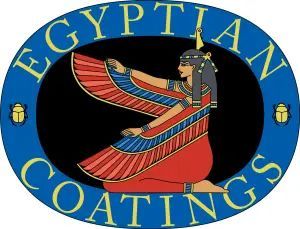FAQs
Egyptian Coatings
Have an industrial-paint-related question? We have the answer at Egyptian Coatings. Check out these FAQs and give us a call today for more information.
What is the difference between lacquer and enamel?
Both lacquers and enamels can be colored or pigmented. Lacquers are thermoplastic; this means they can be completely dissolved with the solvent in which they were made. Lacquers dry by solvent evaporation.
On the other hand, enamels cannot be completely redissolved with their original solvent. The solvent may lift and even remove the enamels, but this leaves behind flakes and undissolved particles. Enamels dry by solvent evaporation and then cure by oxidation (this is where oxygen reacts with the polymer vehicle and forms a new oxidized polymer) or crosslinks with another polymer added to the enamel.
We like to compare lacquers and enamels to scrambled eggs. If you let uncooked scrambled eggs dry completely by evaporation, you can still make scrambled eggs by adding water. The dried egg film is equivalent to a lacquer.
If you fry scrambled eggs, the eggs will not redissolve in water. The proteins in the eggs have undergone a chemical reaction, crosslinking to form a new polymer. This is equivalent to an enamel.
Can you make good, cheap paint?
Yes. At Egyptian Coatings, we believe all good paints are economical paints. Our paint can cover 200 to 500 square feet per gallon. Even at $100 per gallon, this becomes as cheap as 50 to 20 cents per square foot. It's worth noting that these prices don't diminish the quality of the product - this paint is designed to protect the substrate for many years. Additionally, you can save many hours of application with this product; it's known to adhere easily and completely.
I need to buy “XYZ Company’s HMX-100-2.” Can you make it?
HMX-100-2 is the internal number system for XYZ Company's paint. Even with a formula number, we do not know the company's formula and cannot recreate an exact copy.
With that being said, we can work with a wet sample. If provided a wet sample, we can approximate the paint or, in many cases, make it work better in your production process when compared to the competitor's offering.

Share On: